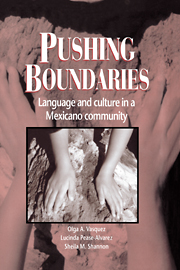Book contents
- Frontmatter
- Contents
- Foreword
- Preface
- Chapter 1 INTRODUCTION
- Chapter 2 EASTSIDE: A MEXICANO COMMUNITY
- Chapter 3 HOME AND SCHOOL CONTEXTS FOR LANGUAGE LEARNING
- Chapter 4 BILINGUAL CHILDREN CROSSING CULTURAL BORDERS
- Chapter 5 NEGOTIATING CULTURE AND LANGUAGE IN THE HOME
- Chapter 6 MOVING TOWARD A RECOGNITION PERSPECTIVE
- Chapter 7 MEETING THE CHALLENGES OF DIVERSITY
- Notes
- References
- Index
Preface
Published online by Cambridge University Press: 26 March 2010
- Frontmatter
- Contents
- Foreword
- Preface
- Chapter 1 INTRODUCTION
- Chapter 2 EASTSIDE: A MEXICANO COMMUNITY
- Chapter 3 HOME AND SCHOOL CONTEXTS FOR LANGUAGE LEARNING
- Chapter 4 BILINGUAL CHILDREN CROSSING CULTURAL BORDERS
- Chapter 5 NEGOTIATING CULTURE AND LANGUAGE IN THE HOME
- Chapter 6 MOVING TOWARD A RECOGNITION PERSPECTIVE
- Chapter 7 MEETING THE CHALLENGES OF DIVERSITY
- Notes
- References
- Index
Summary
Everyone faces boundaries as they go about their daily living. Some are formidable, some flexible, and many more are imperceptible. Regardless of our ethnicity, gender, or social class, we all participate in a multiplicity of worlds of the home, family, workplace, and an array of secondary institutions. Sometimes, traveling from one world to another is unconscious and effortless. At other times, crossing a boundary separating realms of activity and behavior may be a little more than stepping across a line. In fact, the mere existence of a boundary as a marker of a physical or conceptual expanse of the universe - with its own space, knowledge, language, or behavior - however, does not guarantee its impenetrability. People, material goods, and modes of thought always seem to find a way to get to the other side of boundaries intent on barring exchange. In fact, more often than not, we routinely push boundaries to the limits of their elasticity. We try a new look, we venture out of familiar surroundings, and on occasion we shed old ways of thinking for new ones that fit more appropriately to our existing reality.
Reflecting over the time the three of us spent interacting with the Mexicano community of Eastside, we found that this was definitely the case in our own personal journeys. The metaphor of language“pushing boundaries” came from noting that as individuals, we pushed the many boundaries that encapsulated us as teachers, students, researchers, partners, mothers, interpreters, and ethnic group members.
- Type
- Chapter
- Information
- Pushing BoundariesLanguage and Culture in a Mexicano Community, pp. xiii - xviPublisher: Cambridge University PressPrint publication year: 1994



